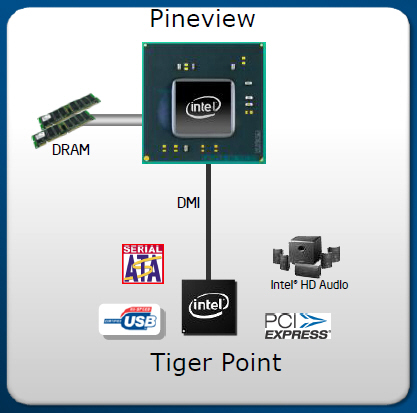Intel Says Atom Pine Trail Platform Still in '09
Intel says that the next-generation Atom is still on track.
We've heard several reports lately from Taiwanese sources that Intel is set to release its new Atom platform codenamed Pine Trail in 2010 instead of the original 2009, but apparently that's not true.
Intel went on record at the Intel Technology Summit on Wednesday in San Francisco that Pine Trail is on schedule.
"Pine Trail is on schedule. You can quote me on that... The three chip solution down to two chip solution [is] coming this year," said Mooley Eden, Intel's GM of Mobile Platform Group, as quoted by Engadget.
Pine Trail is the platform for the new Atom Pineview processor, which integrates the GPU with the CPU. "We are going to integrate the graphics to get better performance," Eden said in a CNet story.
As for a real date? "We are going to ship revenue shipments in the second half of the year," he said of Pine Trail. "You come to IDF [in September] and see the maturity of the product."
Get Tom's Hardware's best news and in-depth reviews, straight to your inbox.
-
slickuser whats wrong in that statement? Intel's integrated graphics is notReply
the best but serves well enough for most uses for basic tasks
including watching movies. -
apache_lives slickuserwhats wrong in that statement? Intel's integrated graphics is notthe best but serves well enough for most uses for basic tasksincluding watching movies.Reply
Haha then why did they want to get "better performance" ? -
tacoslave amd would pwn intel if they did the same thing. come on 780g with a low power Athlon = pine trail killer. come amd step into it.Reply -
apache_lives tacoslaveamd would pwn intel if they did the same thing. come on 780g with a low power Athlon = pine trail killer. come amd step into it.Reply
I was hoping they would bring the old K7/AthlonXP design from 130nm to 45nm/32nm with a few tweaks and low clock speeds to counter the Atom sooner or later - its otherwise an Intel owned market. -
matt87_50 its like saying in this day and age "we're going to give our military archers longer range bows better performance".Reply
well, it may be 'better' but that sure as hell doesn't mean it's GOOD, or even good enough! -
If the GPU part end up good enough to decode 1080p content and allowing some low-setting gaming in smaller resolutions it's definitely a big deal for consumers and Intel both.Reply
While I'm not really in the market for a laptop or nettop myself that's the kind of performance level I'd expect from such a GPU solution.
On the other hand, if it's not good enough for that kind of work we'll end up paying more for less as we'd still need a third party chipset to go with the integrated GPU. -
downer88 Exodite10If the GPU part end up good enough to decode 1080p content and allowing some low-setting gaming in smaller resolutions it's definitely a big deal for consumers and Intel both.Even Ion with nvidia chip wasn't able to play Blu-Ray.Reply
You can't expect miracles from only _8 watts_ for 1.6 Ghz dual core Atom 330. Even 2.0 Ghz single core VIA C7 is 20 watts. Much more realistic processors at 35 watts for AMD and Intel --even for nettop. -
enewmen matt87_50its like saying in this day and age "we're going to give our military archers longer range bows better performance". well, it may be 'better' but that sure as hell doesn't mean it's GOOD, or even good enough!The nVidia Ion can decode 1080p fast enough, but useless if the CPU can't decode HDCP fast enough.Reply
Enough though the Atom is fast enough for normal office/web apps, being able to view HD movies should also be part of the min specs.
Anyway, this is where I draw the line between better and good.
-
jimmysmitty Everyone is thinking more in terms of gaming. The IGPs Intel currently has is great for decoding Blu-Ray and HD 1080p.Reply
Integrating the GPU onto the die will lower latency and probably allow for better eprformance. Of course we cannot judge it until we see it but for the purpose Intel set it to be it will do fine.
And a Athlon CPU would have to be quite small in order to compete. They would have to do as Intel did and strip a lot from it. Atoms size and power usage alone is so minimal that unless AMD cut down a lot of features the Athlon XP even at 45nm would not be able to compete.

